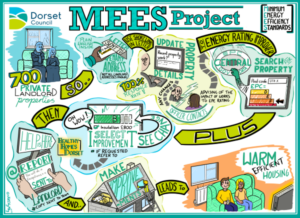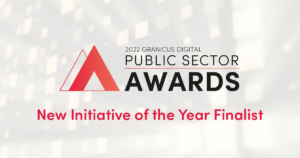
A new digital initiative to help Dorset’s landlords make their homes more energy efficient has received national recognition.
The Dorset Council ‘Minimum Energy Efficiency Savings’ project is a finalist in the Granicus 2022 Digital Public Sector Awards in the ‘new initiative’ category.
To find out why, read our case study below.
Unlocking the key to reaching hundreds of people
If you need to reach nearly 700 people but you don’t have their names or know where they live – then the hope of achieving a 100% response rate would seem nigh on impossible.
But that’s exactly Dorset Council achieved thanks to a new digital way of working.
The council was tasked with contacting the county’s landlords with the aim of helping them improve the energy efficiency of the properties they rent out.
However, the task was huge. The only information the council had was the addresses of the rented properties – it did not have all the names or personal addresses of the landlords that owned them.
Service Manager for Housing, Richard Conway, explained: “Last year we were awarded money from the government to run a programme to improve rented properties with very poor heating and energy performance.
“Currently, it is illegal to rent a property with an EPC rating of F or G unless the landlord has an exemption. The government is also considering making it illegal in the future to rent properties with an EPC lower than C.
“It was therefore crucial for us to make contact and engage with Dorset’s landlords.”
The first job of the project was to contact rental property owners.
Richard added: “The scale of the task was huge. We had to contact around 700 landlords of the lowest energy rated properties. We didn’t know their names or where they lived – we only knew where the rented properties were.”
Using a digital mailing system called Doc Mail, the team were able to send letters to all the rental properties on the EPC database. A bespoke envelope with strapline and logo was also designed, with the aim of increasing engagement.
Meanwhile, the council’s ICT and digital teams worked together and developed an online solution that once the landlords had received their letter, they could then easily access on a phone, tablet, laptop or computer.
Once online, the landlords were able to answer yes and no questions, which provided the housing team with all the information they needed to progress their case.
No officer time was needed and all contact and communication with the property owners, including email replies, were automatically generated.
Plus, a tailored response, using the details the landlords had submitted, was automatically sent out. In return, the housing team would also receive an automatic email telling them the landlord had responded.
Under normal circumstances, when the team sends out unsolicited letters, it would expect a response rate of under 5%. The team would also have to chase many hundreds of cases just to make contact.
By contrast, this online solution achieved an initial response rate of more than 40% in the first few weeks and by the time the project was completed, they achieved a 100% response rate.
Digital also helps improve services
But a good response rate was not the only success story of this project.
Going digital also improved the service the landlords received – and in turn will benefit their tenants. 
At a few clicks of a button, the landlords were not only able to access their own EPC data, but they could check how adding things like loft insulation would affect their energy performance rating and how much it would cost them.
“As far as we know, this type of tool is not available anywhere else online in the UK,” Richard added.
“With help and guidance from our digital team and ICT colleagues, we have been able to develop our very own energy performance tool, which is now on the council website.
“Although it is designed for landlords, anyone can access it. This tool enables people to look at an EPC and see how the rating changes by adding or subtracting improvements.”
Check out the council’s energy rating improver here: Energy efficiency ratings for rented homes – Dorset Council
No housing officer is needed in this process, which frees up their time for other work and helps save the council money.
The council has used the feedback gathered from online users to continually tweak and improve the service.
Richard concluded: “Our example shows how going digital can increase your efficiency and effectiveness, save your officers enormous amounts of time, and help us achieve our goals, while at the same time achieving a high level of satisfaction from the people using our service.
“In summary – go digital!”
The 2022 Digital Public Sector Awards will be announced on 15 November.

I have worked in communications for 25 years, first as a journalist and then in public and private sector public relations. From Southampton originally, I have lived in beautiful Dorset for the last two decades. My passion for Dorset has also turned into a passion for landscape photography. My other great loves are my family and Southampton Football Club.


